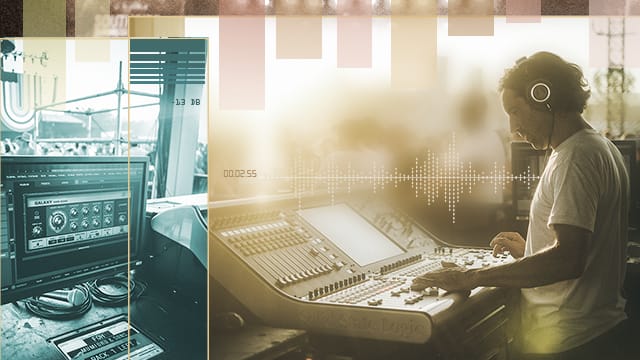R&B Producer JR Hutson Delivers the Soulful Goods for Musiq Soulchild, Jill Scott & More.

JR Hutson is a highly-in-demand songwriter and producer in LA’s thriving R&B scene. Best known for his work with Jill Scott, Hutson also produced Musiq Soulchild’s GRAMMY®-nominated song, "Sobeautiful". Hutson is no newcomer to the music business. His mother was a professional opera singer in NYC and his father was an R&B musician. Hutson was in a professional boys choir that toured the world, and he got his first record deal while still in high school in Miami. He took time out from a very busy schedule to share with us his secrets for getting such smooth vocal tracks.
I did!
If I'm writing a song, and producing it, making the music for it, usually the melody that I wrote kind of guides where the music goes. So I already know what I'm accompanying while I'm laying down the tracks. I just have more of a knowledge of what I'm doing, and it just lends itself to wrapping itself around the song a lot more.
When I'm getting into somebody else's song, I have to get that knowledge from them, or I have to listen to it and imagine what perspective I would be coming from if I wrote this song. Because when I make tracks, I don't just deal with it from a music perspective, I deal with it from a psychological perspective as well. If a song is talking about a heartbeat, then I might stutter the drum pattern like a heartbeat, or something like that. I always try to come from a psychological standpoint as well, just to make it a little more interesting.
"[W]ith the click of a button, I can put the Neve EQs, I can put the Roland [RE-201 Space Echo] delay, or any of that stuff on it, and just do exactly what I hear as I'm doing it. It's a considerable difference, in a very, very positive way."

Roland RE-201 and Neve Plug-Ins for UAD at NAMM 2010
I am probably the biggest fan of Logic that there is. I call myself a Logic evangelist [laughs], because I'm such a proponent for Logic. I got converted to Logic maybe four or five years ago. Since then, I think I've converted so many people. I really feel like it's my mission to get everybody using Logic.
Before I started using Logic, I would have rough mixes and final mixes. But once I got into Logic, and I got the UAD Powered Plug-Ins and all that, I can get things so much closer to what they're supposed to sound like. You know what I'm saying? That's been the biggest difference for me.
It was frustrating to do a song, and know what it needed to sound like, but I couldn’t really get it there. Most of us musicians are lazy in that we don't really want to deal with all that hardware, all the bussing and patching. We just want to write and play. So when I was dealing with hardware, if there wasn’t an engineer around that I could just tell, "Do this, this, this, and this," then it just didn't get done.
But now, everything's right there. They're already in a mix, they're already on faders, and with the click of a button, I can put the Neve EQ, I can put the Roland [RE-201 Space Echo] delay, or any of that stuff on it, and just do exactly what I hear as I'm doing it. It's a considerable difference, in a very, very positive way.
Absolutely, by far, all the Neve stuff. Which is really what drew me to the card. I was looking for something to give a warmer sound, and it totally did the job. I also use the FATSO a lot.
Oh yeah, I use that a lot. And I really like the Harrison [32C EQ]. I like the presets that are in there. I'm a preset guy. So nine times out of ten, if there are no presets, I'm not going to use it.
Right. Which is probably why I use that the most, because of what the presets were named. [Laughs]. But they actually sound really, really good. And like I said, honestly, if there were no presets in there, and it was left up to me to turn knobs, I probably wouldn't be using the stuff. A big selling point to me for your guys' stuff is the presets.
You know what my secret is, honestly? Especially with them. My whole thing with vocals is the less you put on it going into recording, the better it's going to be.

at UA’s 2010 NAMM booth
Yeah. If I can I like to just go direct, and then mess with it after the fact. Especially with an artist like Jill or Musiq, you want to capture exactly what they're doing, you want all the nuances. You really don't want to affect it. You want to get what they're doing, and then you want to figure out the best way to showcase what they're doing. If they're doing something that has a lot of dynamic changes, you don't want to slam it, compression-wise, because then you're going to lose all that.
I pretty much use the Neve plugs on everything. I have my system set up to where it's like everything's going through a Neve board. I put one of those [Neve 88RS] channel strips on every track.
"I pretty much use the [UAD] Neve plugs on everything. I have my system set up to where it's like everything's going through a Neve board. I put one of those [Neve 88RS] channel strips on every track."
They just give warmth to the track, without even putting a preset on there. I just pop the plug-in on the track, and it's a subtle difference, but I can definitely hear it. Actually, I feel it more than I hear it. I think that's what a lot of people were missing, going from hardware to software-based recording. I know I was missing the feel, and the thickness. So my remedy for that has been to use the Neve plugs, and put one on each track. It definitely has made a difference to me.
We were using a Neve, a vintage Neve mic pre with a Neumann U 67. And then we were using one of the Universal Audio 1176s as the limiter. When we mix I really love the [Roland] Dimension D plug-in. We use that a lot, on bass, on vocals. I use that all over the mix.
Because I love the old-school Dimension D, but you don't see them in studios anymore. I was using it as a chorus on bass, for instance, because Jill Scott is very rhythmic. It just helps fatten the bass up, and make it a little bit wider. And it also makes room for her vocal to come out a little bit. Because it basically makes the bass stereo.
I was using the Neve [88RS] channel strip as well. It sounds great. It's really, really close to an actual one, in terms of the color that it gives in the low end.
On the high-end, we were using a vintage mic pre to record vocals, but I also, as an EQ, used the Neve [88RS] channel strip on her, for lead vocals and for background. I used another parametric EQ to carve or shave off, and then I actually put the Neve EQ just for the high end, because the high end on it sounds really good. It just makes it sound clear.
I'm working on Latoya Luckett, India.Arie, Jordan Knight from New Kids on the Block, Jennifer Hudson, Anthony Hamilton—I'm just looking at my schedule right now…
And then of course we're working on Musiq’s new album, and working on Jill's new album.
"[On Jill Scott’s vocals] we were using one of the Universal Audio 1176s as the limiter. When we mix I really love the [Roland] Dimension D plug-in. We use that a lot, on bass, on vocals. I use that all over the mix." —Sean Tallman
Absolutely. No question. It's just like anything else. The more knowledge you have about something, the better you can be at it. And I don't mean so much like book knowledge. I think there's some people that kind of go overboard with the book knowledge, but just knowledge in general. It's good to know music theory, but then it's also good to understand what it takes to not go overboard with making a record. Knowledge of how other people approach records, or how other writers approach songs, and knowledge of what key your song is in, or what the chord structure of your favorite song is. I think all of that is crucial to longevity.
It might not be important to having a one-hit record, but it's definitely been the reason why I've been able to keep doing this. I've never had another job. This is all I've ever done since I was fifteen. This is the only job I've ever had. And I live very well.
Yeah. You know what was special about it? I think my parents understood the value of me being able to express myself through art. They totally understood. They understood it to the point where they knew that I was going to need certain tools or I was going to be frustrated. They totally understood that, so they tried to help me.
Yeah, they did. My mom, she sang for the Metropolitan Opera, so she was really involved in her own career. And my dad released eight albums for Warner Bros., and he wrote "The Ghetto" with Donny Hathaway. He did a lot of stuff himself.
Oh, yeah. Our family, we're very happy. It was shown to me at a very early age that it was OK to pursue your passion. And that's valuable, because to me now, it equals freedom. You have to be very self-motivated, but there's a vast amount of freedom being able to do what you love.
After my solo deal, when I started producing. I met up with Pharrell Williams, and I signed to Pharrell as a writer. I started doing projects with Pharrell, and Star Trak, and that's when I came out here to do an artist of Pharrell's named Vanessa Marquez. Once I got to LA, and started working on her project, I really liked it, and I just decided to stay out here.
Yeah, I do.
Yeah. I've done a lot of backgrounds on Jill's last album, and this album. I'm actually singing a lot more. I'm thinking about doing a project. You never lose that. So that may come. I may spring that on everybody very soon. Definitely.
To find out what else the multi-talented singer/songwriter/producer is up to, and to hear some of his projects, go and visit JR Hutson's web site.
— Marsha Vdovin
-
On Sale
Neve 1081 / 1081SE Classic Console EQ
Add to CartRegular Price: $249.00
$149.00
You'll Save 40%
-
On Sale
Neve 31102 / 31102SE Classic Console EQs
Add to CartRegular Price: $249.00
$149.00
You'll Save 40%
Read More
The Human Element
Learn how SOHN (aka TophTaylor), uses UAD plug-ins and his Apollo x8p interface for his ultra-textured laptop symphonies and how he learned to embrace the human element in his recordings.
Tube Versus Solid-State Compressor Basics
Learn essential functions of popular tube and solid-state compressor varieties, and creative uses for your productions.
Mumford & Sons on the Road with UAD-2 Live Rack
Mumford & Sons FOH engineer Chris Pollard details how he uses UAD-2 Live Rack and UAD plug-ins to shape the chart-topping group's string of sold-out shows.




